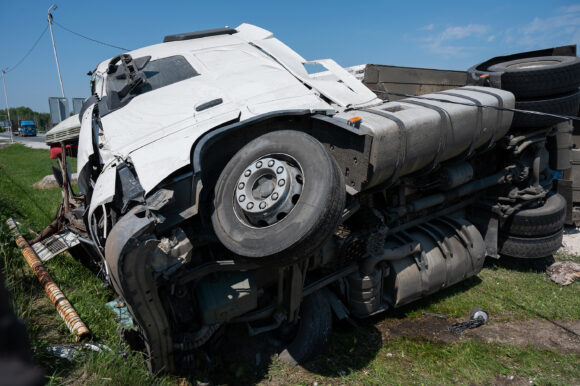The Arizona Supreme Court Tuesday reversed a ruling that allowed the family of the victim of a fatal crash to pursue punitive damages against a trucking company, reasserting its holding in a 1986 decision that negligent acts alone are not reason to tack on extra damages.
“Absent proof of the intent to cause harm or that the defendant acted out of spite or ill will, outrageous conduct will always be required to sustain a claim for punitive damages in negligence cases,” the 6-0 decision says.

Defense attorney Eileen D. GilBride, who represented Swift Transportation in the case, said the ruling makes important clarifications to Arizona law on when punitive damages can be awarded.
GilBride, a partner with Jones, Skelton & Hochuli in Phoenix, said the rules seemed pretty clear in 1986 when the Supreme Court in a pair of decisions held that a jury must find outrageous conduct or evidence of an “evil mind” — meaning intent to do harm — to award punitive damages. But the high court muddied the waters a year later when it ruled in Gurule v. Illinois Mutual Life Insurance Co. that a jury can infer intent if a defendant continued actions that made it inevitable or highly probable that harm would result, she said.
“As the court noted, in a negligence case, it is highly unlikely that someone who is simply negligent is going to have intended to cause harm or have been motivated by spite,” GilBride said in an email. “So negligence cases do require the outrageous conduct. This is a very important clarification in the law.”
The case stems from a Jan. 9, 2018 multi-vehicle crash on Interstate 17 near Cordes Junction, Arizona. Brian Vanderhoff, a driver for Swift, was pulling an empty trailer back to Phoenix on a rainy night when his truck hydroplaned and jackknifed. Another truck, while attempting to avoid Vanderhoff’s truck, collided with two other vehicles. The crash killed two people and injured three, according to local media reports.
Vanderhoff admitted that he was aware of several hazards that increased the risk of an accident.
- He was driving with the “Jake Brake”engaged. The device uses the friction of the motor to slow the truck, but it is supposed to be disengaged when it’s raining.
- He had the cruise control engaged even though he knew he was not supposed to use the device when it’s raining.
- He was pulling an empty trailer, making hydroplaning more likely.
- He chose to pass a vehicle on the right while going downhill around a curve at an excessive speed.
- He was talking to his daughter on a Bluetooth device at the time.
- After the accident, he waited five minutes before getting out of the truck to set up safety triangles to warn oncoming traffic.

Accident victims Thomas Mountz and Paul Champion sued Swift. Mountz is the husband of Julie Mountz, a 59-year-old retired school teacher from Traverse City, Michigan, who was killed in the crash.
The plaintiffs filed a motion seeking the court’s permission to seek punitive damages. Yavapai County Superior Court Judge Krista M. Carman ruled that the numerous safety violations were adequate grounds for pursuing punitive damages. The Court of Appeals denied a petition from Swift seeking to overturn the ruling.
Swift appealed to the Supreme Court and persuaded the justices to reverse the trial court.
The opinion says even though Vanderhoff’s actions were admittedly negligent, they did not amount to the sort of outrageous conduct that would demonstrate he acted with an evil mind. While he was driving too fast for conditions, he was still traveling far less than the posted speed limit of 75 mph, the court said. He should have disengaged the Jake Brake, but his decision not to do so was, at most, a breach of a truck driving safety protocol.
“Absent proof of the intent to cause harm or that the defendant acted out of spite or ill will, outrageous conduct will always be required to sustain a claim for punitive damages in negligence cases,” the opinion says. “The distinction between ordinary or even gross negligence and the conduct that permits punitive damages is critical. Indeed, it will be only the rare negligence case that meets this standard.”

Jonathan V. O’Steen, a Phoenix attorney who served as amicus counsel for the Arizona Association for Justice and Trial Lawyers Association, downplayed the significance of the ruling. He said the ruling was “case-specific to the facts of the particular crash.”
O’Steen, a partner at O’Steen and Harrison in Phoenix, said plaintiffs’ attorneys have long known that they most show a defendant’s conduct was intended to cause harm or was outrageous in order to pursue punitive damages. He said the court did not address whether the complete series of safety violations, when considered together, constituted a “conscious disregard” that could merit a punitive damages award.
“Although the jury in Mountz may not be instructed on punitive damages, if jurors are offended by the conduct of the defendants for the multiple safety violations, the verdict likely will reflect that sentiment,” he said in an email. “This decision will impact punitive damages in some claims, but the vast majority of ‘punitive damages’ cases pre-Mountz remain so today.”
Editor’s note: The photo above is for illustrative purpose only and does not depict actual events.
Was this article valuable?
Here are more articles you may enjoy.


 When the Workplace Is Everywhere: The New Reality of Workers’ Comp Claims
When the Workplace Is Everywhere: The New Reality of Workers’ Comp Claims  ‘Structural Shift’ Occurring in California Surplus Lines
‘Structural Shift’ Occurring in California Surplus Lines  Besieged Berkshire Utility Tries to Rewrite Who Pays for Wildfires
Besieged Berkshire Utility Tries to Rewrite Who Pays for Wildfires  Judge Upholds $243M Verdict Against Tesla Over Fatal Autopilot Crash
Judge Upholds $243M Verdict Against Tesla Over Fatal Autopilot Crash 